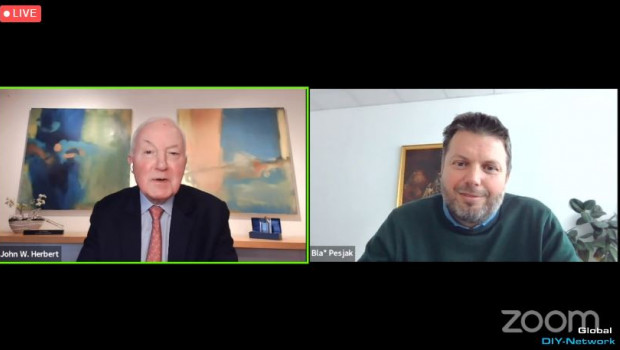During the Global DIY-Network yesterday, Edra general secretary John Herbert spoke with Blaz Pesjak, CEO of the Slovenian DIY store chain Merkur. He joined the company in 2010 when it was on the verge of insolvency. He and his team convinced investors that Merkur's market shares were resilient, cash flows were stable and the business model was good. It paid off to persevere and the company finally got back on track. One of the reasons for this, according to the CEO, was the loyalty of customers to the Merkur brand. This has been built up over the last 125 years which the company can now look back on. "Merkur is part of the country's DNA. Everyone here knows what we stand for and what we offer. Many people can hardly even come up with anyone else when they think of DIY products," he emphasised.Merkur operates 23 DIY stores in Slovenia and generated sales of EUR 215 mio this year. With an average size of 4 000 m², these locations are no megastores, as Pesjak emphasised, but he feels such formats would not suit the local market conditions either. He explained that the customers could be offered everything they need from one provider with a suitable range of products.The retailer also intends to score with a focus on do-it-for-me. For example Merkur has been offering complete packages for around eight years, in particular for bathroom renovations. This includes the planning, design, financing, installation and a guarantee. Installation is carried out by tradesmen, but the customer's only contact partner is Merkur. The package is also possible, for example, for the areas of roofing, windows, doors or the garden.The CEO is particularly proud of the TEO service, a complete package offering energy-related renovations for homeowners. These include an on-site visit with a personal consumption analysis, planning of individual requirements, financing options and the provision of the required forms."Many consumers do not know what energy efficiency is or which products and services are suitable to improve their own ecological footprint," he said.The company wants to support its customers in switching to renewable energy.The concept intends to include solar panels, batteries for storing the energy gained in this way and heat pumps.Pesjak reports that in their own stores too, retailers are working on improving energy consumption and carbon emissions. For example he explains that the lamps have been converted to LED lighting, photovoltaics have been installed on the sites' roofs, car parks have been equipped with charging poles and their own fleets have been converted to electric vehicles.


